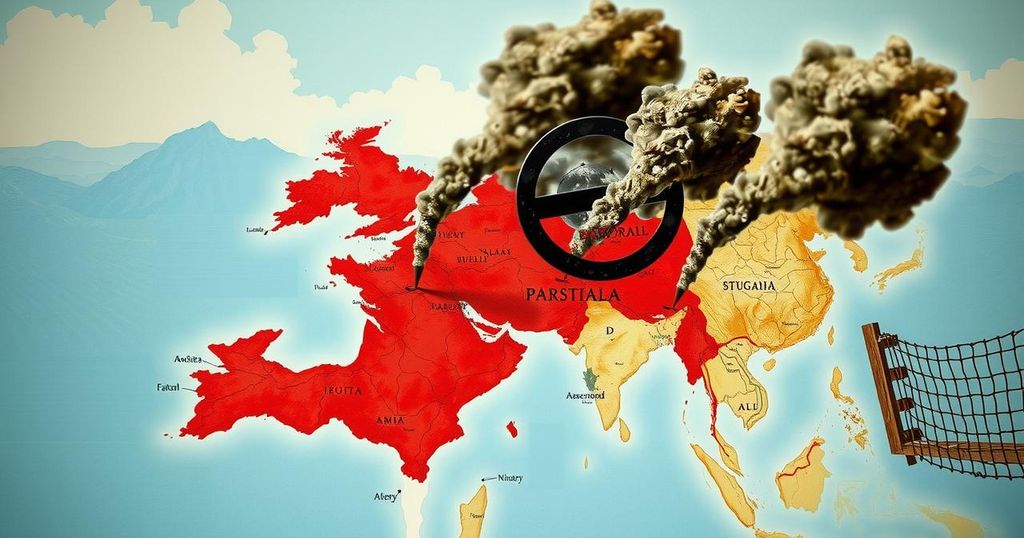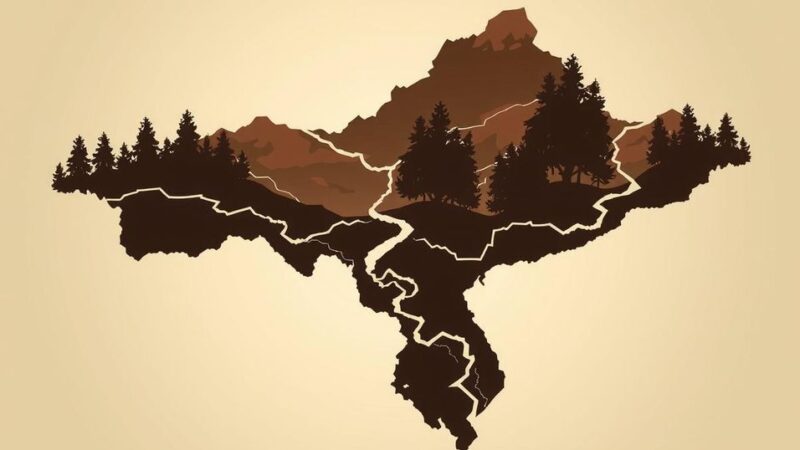The Democratic Republic of Congo is experiencing a humanitarian crisis as fighting with the M23 rebel group escalates, prompting many to flee to Rwanda. The UN and regional forces engage in a battle to protect civilians amid severe risks, underscoring the urgent need for international intervention. The conflict raises concerns of widespread violence, impacting both local and regional stability.
The situation in the Democratic Republic of Congo has rapidly deteriorated, with many fleeing to Rwanda as heavy gunfire rings out in Goma amidst fierce fighting involving the M23 rebel group. This rebel group, primarily composed of ethnic Tutsis, has significantly advanced, claiming territory close to the Rwandan border and inducing fear in the city’s two million residents. Muahadi Amani, a local displaced by the conflict, expressed her desperation for safety, especially for her children, highlighting the urgency of the situation.
The conflict escalated following Congo’s diplomatic severance with Rwanda, accusing it of supporting the M23 rebels. In response, the Congolese army, supported by United Nations and regional forces, is striving to repel the insurgents. President Félix Tshisekedi convened a crucial meeting with military leaders, issuing orders to drive the rebels away from Goma, and lamenting the loss of the military governor of North-Kivu amidst the clashes that have already claimed numerous lives.
The violence has had disastrous consequences, resulting in many casualties among both peacekeepers and civilians. Reports indicate that at least 13 peacekeepers, including troops from South Africa and Malawi, have lost their lives in recent clashes, with many civilians wounded and displaced. This alarming situation has captured international concern, with the UN emphasizing the urgency of humanitarian access and the protection of civilians amid the escalating violence.
In a recent emergency Security Council meeting, Bintou Keita of the UN expressed grave concerns about the ongoing military actions. She reported that the M23 and Rwandan forces have infiltrated Goma’s outskirts, leading to mass panic and cutting off vital infrastructure, exacerbating the humanitarian crisis in the region. She stressed the need for immediate action to safeguard civilians and UN personnel trapped in the area.
The UN reaffirmed its commitment to Congolese sovereignty, with calls for decisive action against the M23 group and its supporters. Jean-Pierre LaCroix underscored MONUSCO’s mandate and the sacrifices made by peacekeepers, emphasizing the necessity for global unity in addressing the threat posed by the rebel forces. France has also voiced its concern, advocating for a Security Council meeting and condemning the offensive led by the M23.
As the M23 rebel group continues to seize ground, fears are mounting that the situation could escalate into a wider regional conflict, with significant implications for neighboring countries. South African President William Ruto has called attention to the deteriorating humanitarian conditions resulting from the ongoing violence, urging for immediate cessation of the hostilities. Since 2021, efforts by the UN and regional forces have focused on preventing the M23 from claiming Goma, yet the group’s advances continue unabated in the mineral-rich and conflict-prone eastern region of the Democratic Republic of Congo.
The conflict in the Democratic Republic of Congo has roots in historical tensions among ethnic groups, particularly between the Tutsis and Hutus, leading to devastating regional implications. The M23 rebel group emerged from discontent among former soldiers from previous conflicts, and their resurgence has been linked to alleged support from neighboring Rwanda. The volatile merger of local grievances and international dynamics complicates efforts to stabilize the region, where widespread humanitarian crises continue to unfold.
The situation in the Democratic Republic of Congo poses urgent humanitarian challenges, with international concern growing over the ongoing conflict and the effects on civilian populations. As the M23 rebel group continues its advance, immediate actions from the UN and regional powers are imperative to avert escalating violence and safeguard the lives of innocent civilians caught in the crossfire. The commitment to stabilizing the region and addressing the root causes of the conflict remains crucial for lasting peace.
Original Source: www.sbs.com.au






